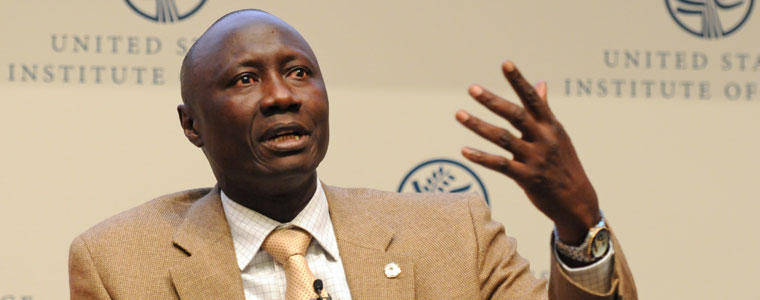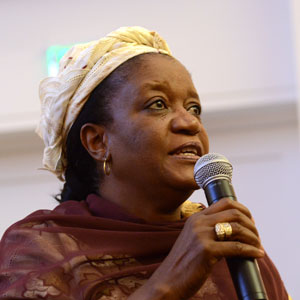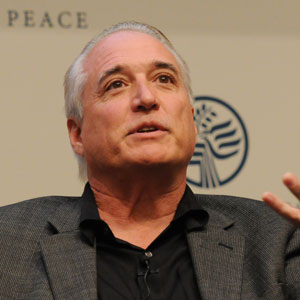Dying to Be Men: Symposium Digs for Roots of Gender Violence
Colonel Birame Diop is considered a rare success in his family’s neighborhood in Senegal -- a pilot in his country’s Air Force who went on to serve as a top adviser to the Chief of Staff and a global expert on the role of military in society.

Under Senegal’s social norms, his achievements reflect well on his mother and show that she was a good wife to his father, Diop explained to an audience at the U.S. Institute of Peace this week during a two-day symposium called “Men, Peace and Security: Agents of Change.” Senegalese men are expected to find a house and protect the family’s health and security, regardless of whether their wives work, as they often do, or even regardless of which of them makes more money.
But in a country where 70 percent of the population is between 16 and 35 and jobs are scarce, such expectations pose an almost impossible hurdle to the ideal of manhood.
“The situation is so challenging that men, who are considered as being at the epicenter of everything in our society -- the pressure on these people is so high that failure is not at all an option for them,” said Diop, who serves as director of Partners Senegal: Center for Change and Conflict Management. “Some who have not been able to be what their society expected them to be can turn against the same society to express their frustration” through violence, he said.
Diop and more than three dozen keynote speakers and panelists at the symposium waded into volatile subjects like the paradox of hyper-masculinity, the threat of “failed adulthood,” and the lure of power through violence. The 245 participants and a follow-up training for practitioners on a third day explored how male identity and societal norms contribute to violent conflict and, conversely, might be altered to support peace.
The symposium was co-hosted by the World Bank, the North American office of the Stockholm International Peace Research Institute (SIPRI); Washington-based Women in International Security (WIIS); the U.S. arm of the Brazilian non-governmental organization Instituto Promundo; and the South Africa-based Sonke Gender Justice Network. The event grew, in part, out of a two-year study on lessons learned about programs for women in Iraq and Afghanistan. One of the most consistent recommendations for ensuring sustainable programs that advance peace and security was to include men.
“The tendency among us is to use gender and women interchangeably,” said Kathleen Kuehnast, director of USIP’s Center for Gender and Peacebuilding. “However, this leaves us with half a solution to many of the problems that plague women and girls in conflict and fragile settings.”
The symposium title is a play on the title of United Nations Security Council Resolution 1325 on Women, Peace and Security, adopted 13 years ago this week to urge governments to devise plans for protecting women and increasing their decision-making role during and after conflicts. More than 40 countries have adopted national action plans, addressing a broad range of issues like representation of women in armed forces and at peace negotiations or ending the scourge of sexual assault and other violence against women.
“This isn’t just a question of women,” said Ambassador Donald Steinberg, deputy administrator at the U.S. Agency for International Development. “This is a question of men, it is a question of society, it is a question of equity, it is a question of global peace and security.”
Research has found “only limited evidence that men are more inherently violent than women,” according to a new USIP Special Report entitled “The Other Side of Gender: Men as Critical Agents of Change.” “Violence is ultimately learned and encouraged in the social environment, which suggests that it can also be unlearned.”
Although most men are not, by nature, violent, men do commit much of the violence, Kuehnast told the symposium. Steinberg cited research showing that men are up to six times more likely to commit and be victims of homicides. But at the same time, studies indicate the propensity has “as much to do with early exposure to violence, with economic frustration, with the militarization of societies, with boys’ coming-of-age rituals and gender-based proliferation of light weapons as it does with testosterone,” he said.
“In excluding the very roles and experiences of men in conflict, including as witnesses and victims themselves of violence, we are also limiting our approaches to solving difficult problems like gender-based violence,” Kuehnast said.
The thought-provoking titles of sessions during the symposium capture the quandaries and the questions: “Dying to be Men: Masculinities in Conflict and After;” “How Men Are Made: Cultures of Hyper-Masculinities;” “All Revved Up and Nowhere to Go;” and “Nurturing the Ex-Combatant.”
“What we’re discovering is that there is a societal fragility that we often don’t pay attention to,” said Ian Bannon, sector manager of the Fragile States, Conflict and Social Development Unit in the Africa Region of the World Bank. “And we believe that this question of masculinity, of how do you become a man, has something to do with that.”
Bannon and other experts at the symposium outlined a range of factors contributing to the puzzle. In South Sudan, the “bride price” a young man must pay his intended wife’s family, often in cows, has become exhorbitant, sometimes leading to thefts and resulting in violence. In Rwanda, a young man isn’t considered a man until he builds a house and marries, a prospect made extremely difficult with new housing regulations.
In Afghanistan, riven by three decades of war, boys learn that “if they use violence, they will gain membership in a powerful peer group,” said Haji Nasrullah Baryalai Arasalai, a Pashtun tribal elder and director of the Community Association and the International Foundation of Hope. He remembers his youth in the years before the conflicts that began in 1978, when he attended university to study agriculture alongside girls.
“The last three decades of war … have heavily damaged the social fabric of Afghanistan,” he said.
 |
| Zainab Hawa Bangura |
 |
| Christopher Kilmartin |
Zainab Hawa Bangura, the United Nations Secretary General’s Special Representative on Sexual Violence in Conflict, recounted the daily horrors she hears about: A Somali woman who was raped, along with her daughter. A father fighting for justice for his two daughters, both under six years old and both of whom had been raped. In Bosnia 20 years after the war there, perpetrators walk the streets freely, run for political office, and are allowed to police their communities. She’s also met men who were sexually assaulted in wartime.
“In combating sexual violence in conflict, we must bring everybody [to] the table,” Bangura said, “because there’s no such thing as women’s peace or men’s security.”
The U.S. military also has struggled with accepting women in its forces, most conspicuously with the menace of sexual assault – an estimated 30,000 incidents a year. Sexual assault perpetrators often are survivors of childhood maltreatment, hold hypersexual ideologies, believe in rape myths, and think of men and women as adversaries, said Christopher Kilmartin, a Distinguished Visiting Professor at the U.S. Air Force Academy and a professional psychologist.
Kilmartin called the incidence of rape in the military “outrageous,” but he also lamented what he said was the accepted but counter-productive American concepts of “opposite sex,” or worse, the “battle of the sexes.”
“I don’t think we are going to be able to solve this problem until we start to see men and women as being on the same team,” Kilmartin said, noting that he was speaking only for himself, not the Academy. “We’ve got to end sexism as a social activity.”
The issue is becoming more prominent in the U.S. military as more women join the forces, said General Ray Odierno, the Army Chief of Staff. “We have to change our culture,” he said. “We have this thing in the Army – never leave a fallen soldier. That should include all walks of life.”
Men – and women -- can be successfully encouraged and taught to redefine masculinity and take constructive action, such as soldiers challenging colleagues on pornography or young men being encouraged to express emotions without violence. Programs in Lebanon and Croatia work with boys and young men to deconstruct traditional, stymying ideas of masculinity.
“We do know that boys are born with the inherent ability to form … connections of solidarity with others,” said Gary Barker, international director of Instituto Promundo, a Brazil-based non-governmental organization that works for gender equality and an end to violence against women, children and youth. “This is not a male or female trait; that’s a human trait.”
Diop, the Senegalese Air Force colonel, said that, at a more national level, governments can help with measures that provide jobs to the burgeoning numbers of youth but also better governance and effective communication about cultural beliefs.
“Culture can change, even if it takes time,” Diop said. “Beliefs can evolve positively. If you discuss it the right way, and you have the patience and you use the right wording to discuss these issues, they can change.”



